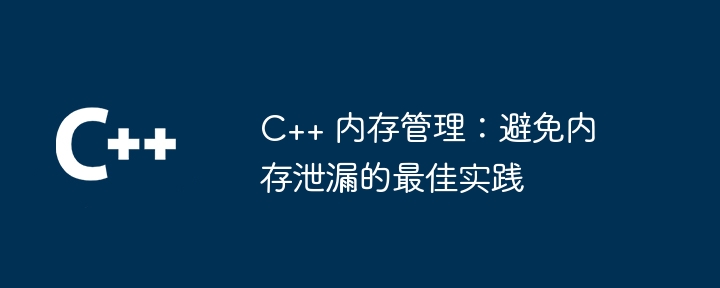Home >Backend Development >C++ >C++ Memory Management: Best Practices to Avoid Memory Leaks
C++ Memory Management: Best Practices to Avoid Memory Leaks
- PHPzOriginal
- 2024-05-03 11:33:02875browse
Memory leaks are a common mistake in C and can be avoided through best practices: use smart pointers to automatically manage memory and avoid dangling pointers. Follow RAII principles to ensure resources are released when they are no longer needed. Write a custom destructor to explicitly release resources. Periodically call delete to release dynamically allocated memory. Use memory leak detection tools to identify potential problems.

C Memory Management: Best Practices to Avoid Memory Leaks
Memory leaks are common errors in C that occur in the future. When freeing memory that is no longer needed. This can lead to severe system resource exhaustion issues. Here are some best practices to avoid memory leaks:
1. Use smart pointers
Smart pointers automatically manage dynamically allocated memory. They destroy themselves when the object goes out of scope to avoid accidental dangling pointers.
Example:
// 使用 unique_ptr 不会因悬空指针导致崩溃 unique_ptr<int> intPtr = make_unique<int>(10);
2. Follow the resource acquisition is initialization (RAII) principle
RAII requires resources to be obtained in the constructor and Release them in the destructor. This ensures that resources are released when they are no longer needed.
Example:
class FileHandler {
public:
FileHandler(const string &fileName) {
fileStream = new ifstream(fileName);
}
~FileHandler() {
fileStream->close();
delete fileStream;
}
private:
ifstream *fileStream;
};3. Use a custom destructor
For objects that cannot use smart pointers or RAII, you can write Customize the destructor to release resources explicitly.
Example:
class MyObject {
public:
~MyObject() {
// 释放资源
}
};4. Periodically call delete
after determining that the dynamically allocated memory is no longer needed , use delete to release it immediately.
Example:
int *array = new int[10]; // 完成后释放数组 delete[] array;
5. Use memory leak detection tools
Tools such as istnie Valgrind can help detect memory leaks. Run them regularly to identify potential problems.
Practical case
Problem: The memory keeps increasing when processing large amounts of data.
Solution: Use smart pointers to automatically manage dynamically allocated buffers. This eliminates dangling pointers and the need to manually free memory, preventing memory leaks.
Conclusion:
By following these best practices, you can effectively avoid memory leaks in C. This will improve application stability, performance, and security.
The above is the detailed content of C++ Memory Management: Best Practices to Avoid Memory Leaks. For more information, please follow other related articles on the PHP Chinese website!

